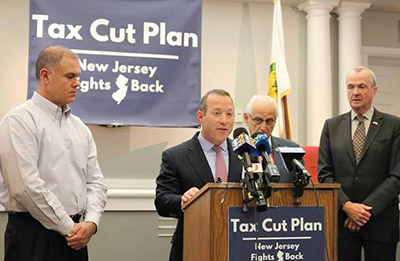
A plan introduced last week by Rep. Josh Gottheimer (D-5) and Gov.-elect Phil Murphy seeks to allow New Jersey residents to donate money to town-run charities in order to claim a deduction equal to the difference in their property taxes over and above $10,000, which were capped as part of the national tax cut plan late last year. Under President Trump’s plan that was signed into law in the waning days of 2017, deductions for state and local taxes, including property taxes, are limited, but charitable donations are not. New Jersey’s property taxes are the highest in the nation, with many in Bergen County paying above $11,000 a year, and some significantly more.
While the Murphy-Gottheimer plan does not address the high cost of local government in New Jersey, nor does it attempt to lower property taxes themselves, the officials’ idea was enthusiastically supported by Congressman Bill Pascrell (D-9) and the mayors of Fair Lawn, Paramus and Park Ridge. It also doesn’t require new state or federal legislation to enact. According to a panel of economists, the effect of the “full deduction rule,” which has been used since 1987 in various states and formats, is that a taxpayer can reduce her state tax liability by making a charitable contribution that is deductible on her federal income tax return.
The plan restores the taxpayer’s previous state and local tax (SALT) deduction by giving a deduction for taxpayers who make charitable contributions to their state or other local governments. States and local governments can establish or support funds that pay for local services, including schools, law enforcement and infrastructure. Taxpayers can make voluntary contributions to these funds, for which they will receive the offsetting tax credit. The contributions will be deductible for federal tax purposes under existing law, even for those who pay the alternative minimum tax. “This structure effectively restores the benefit of the lost state and local tax deduction to the extent of the contributions for most taxpayers who itemize,” according to a release.
“I ran for Congress to cut taxes for our residents and businesses,” said Gottheimer. “The tax hike bill can only be seen one way—as an assault on New Jersey—paid for on our backs. It’s a huge windfall for what I call ‘moocher states,’ those like Mississippi and Alabama, that pay far less in federal taxes than we do and somehow consistently get far more back,” said Gottheimer.
Gottheimer and Murphy noted that many other states, including Alabama, California and South Carolina, have created similar programs to offset federal taxes. The framework of this plan has already been supported by the Internal Revenue Service (IRS) and various tax courts. Currently, there are more than 30 tax credit programs in 22 other states around the country. For example, Alabama and South Carolina use this structure for tuition tax credits. California’s program supports scholarships for lower income students, while Colorado has a program that supports donation of property for conservation purposes.
However, according to the New York Times, allowing a town-run trust to take the place of a local tax-collection process is “relatively uncharted waters; for one thing, such a change in municipal governance would require approval by each town’s local governing body.”
“We continue to look at all avenues for savings for our residents,” said Elie Katz, a Teaneck councilman. “We are striving for a fourth year of a zero percent increase and will work with our state and federal representatives on any other ideas and tools we can implement such as the one proposed.”
The Trump administration seems to be eyeing these moves by states with a critical eye. “I understand what they are trying to do for their cities and their states and their taxpayers,” Gary Cohn, President Trump’s senior economic adviser, said in an interview with Bloomberg Television. “We at the federal government still have to collect revenue so we’re going to have to evaluate what decisions they make in terms of what it does for overall collections at the federal level and the federal tax system.”
Every Republican and Democratic member of the state’s congressional delegation, but for one, voted against the Trump tax plan. The New Jersey Chamber of Commerce, the New Jersey Bankers Association, the New Jersey Realtors, and the New Jersey Business and Industry Association, along with law enforcement and state and local officials across the state, opposed the legislation.
“Before this disastrous federal tax hike bill passed, I committed to fighting tooth and nail for the people of New Jersey, and today marks the first step in that journey,” Gov.-elect Murphy told reporters. “The plan we are announcing today is a simple, innovative way for us to stand up for New Jersey taxpayers. I thank Congressman Gottheimer for his efforts in bringing this plan to fruition.”
“I’m really happy to be working with Congressman Gottheimer and Gov.-elect Murphy on finding ways to cut taxes and save money for our taxpayers. It’s their creative thinking on combating the tax hike plan that will help families in Fair Lawn and throughout the state of New Jersey,” said Fair Lawn Mayor Lisa Swain.
“It’s refreshing to have both state and federally elected officials who answer the phone when a local official calls,” said Park Ridge Mayor Keith Misciagna. “I can say our residents’ number one concern is taxes, and now with the new federal tax hike bill, our residents are worried. New Jersey is already an expensive state to live in, and without some action on our part, these changes will drive people out of our state.”
By Elizabeth Kratz










